Exploring experience of young healthcare professionals in providing treatment to vulnerable patients with chronic conditions
VerifiedAdded on 2023/06/09
|13
|3737
|215
AI Summary
This research proposal aims to explore the experience of young healthcare professionals in providing treatment to vulnerable patients with chronic conditions in the UK. It analyzes the challenges faced by young healthcare professionals and the strategies used by them to provide treatment to vulnerable patients. The study is qualitative in nature and uses in-depth interviews as the method of data collection. The research question is 'What are the challenges faced by young healthcare professionals in providing treatment to vulnerable patients with chronic conditions in the UK?'
Contribute Materials
Your contribution can guide someone’s learning journey. Share your
documents today.
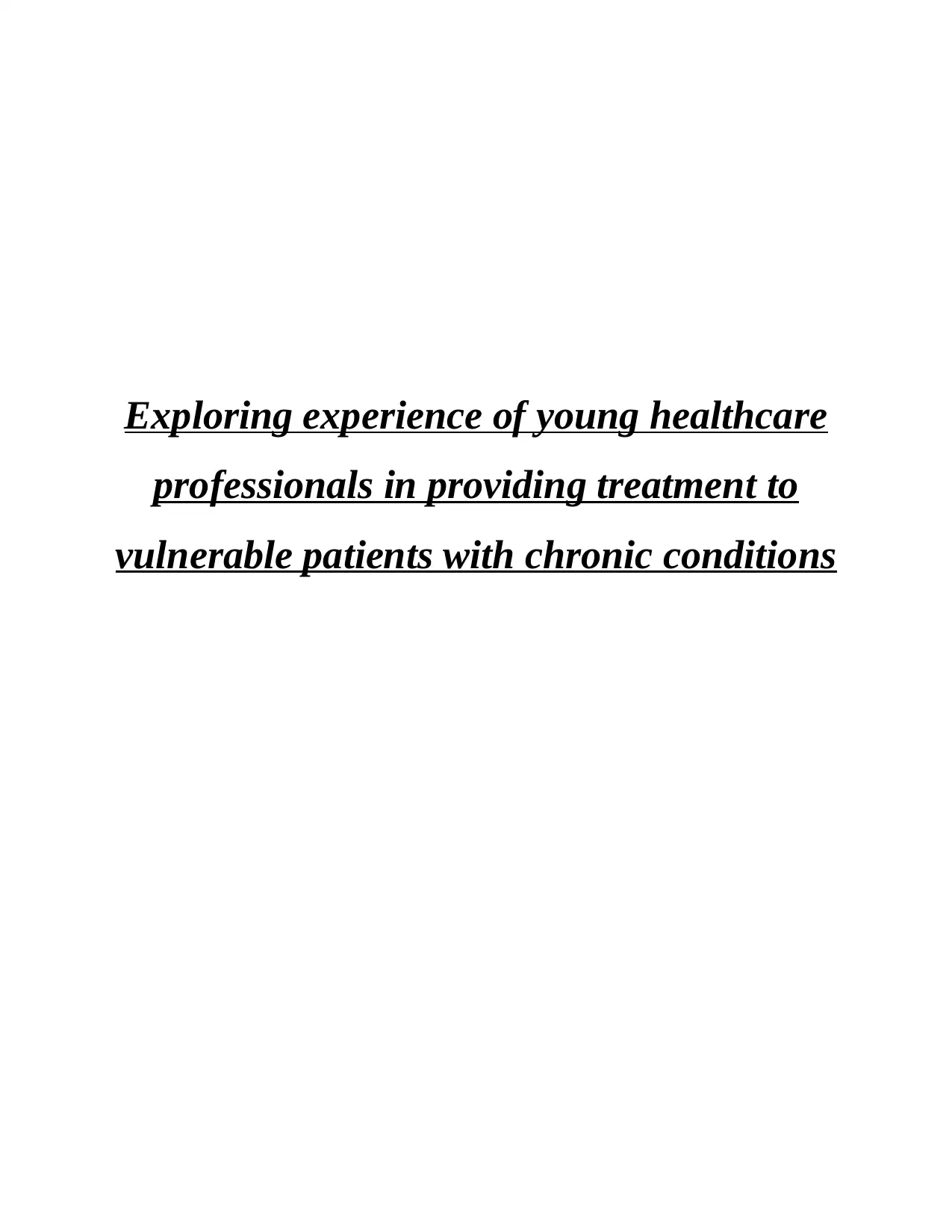
Exploring experience of young healthcare
professionals in providing treatment to
vulnerable patients with chronic conditions
professionals in providing treatment to
vulnerable patients with chronic conditions
Secure Best Marks with AI Grader
Need help grading? Try our AI Grader for instant feedback on your assignments.
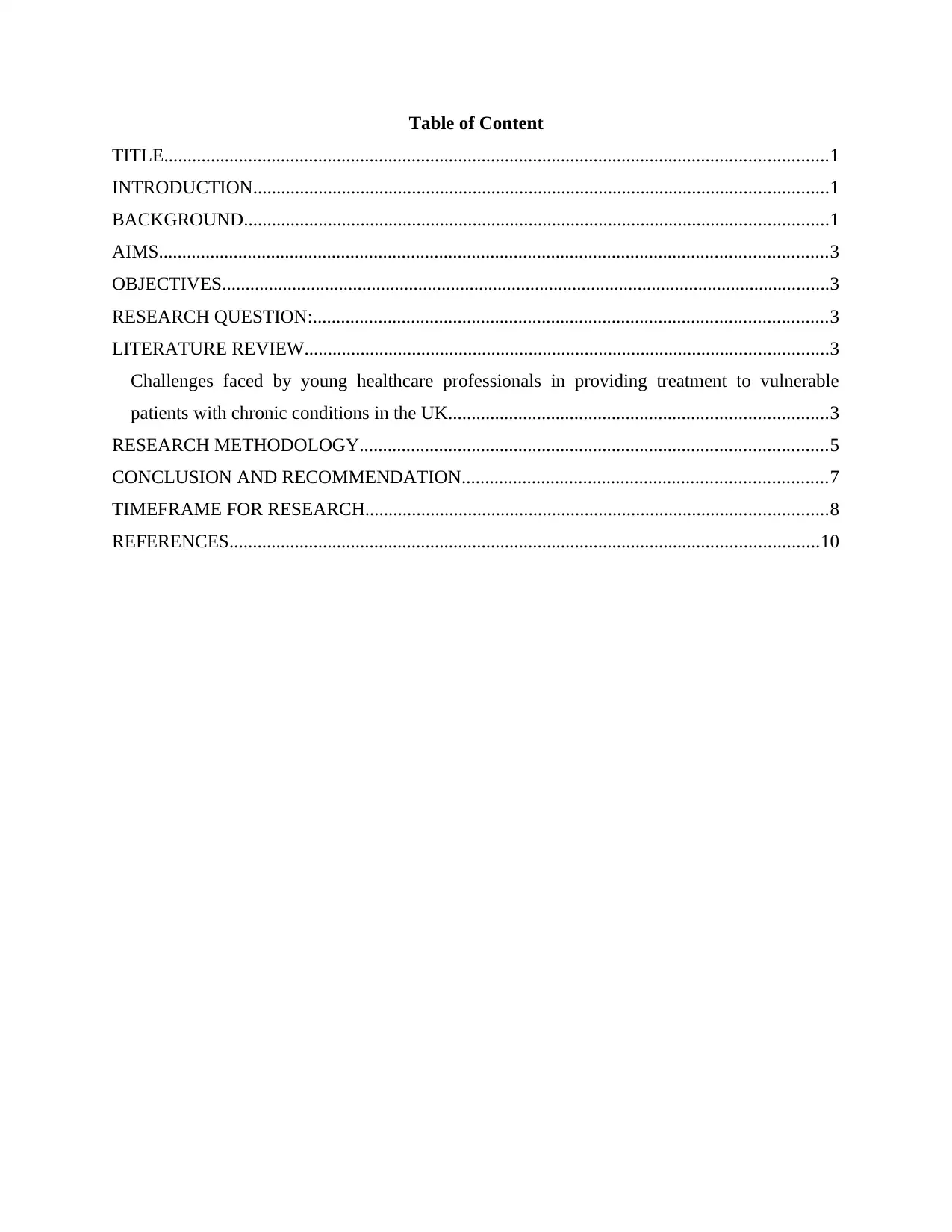
Table of Content
TITLE..............................................................................................................................................1
INTRODUCTION...........................................................................................................................1
BACKGROUND.............................................................................................................................1
AIMS...............................................................................................................................................3
OBJECTIVES..................................................................................................................................3
RESEARCH QUESTION:..............................................................................................................3
LITERATURE REVIEW................................................................................................................3
Challenges faced by young healthcare professionals in providing treatment to vulnerable
patients with chronic conditions in the UK.................................................................................3
RESEARCH METHODOLOGY....................................................................................................5
CONCLUSION AND RECOMMENDATION..............................................................................7
TIMEFRAME FOR RESEARCH...................................................................................................8
REFERENCES..............................................................................................................................10
TITLE..............................................................................................................................................1
INTRODUCTION...........................................................................................................................1
BACKGROUND.............................................................................................................................1
AIMS...............................................................................................................................................3
OBJECTIVES..................................................................................................................................3
RESEARCH QUESTION:..............................................................................................................3
LITERATURE REVIEW................................................................................................................3
Challenges faced by young healthcare professionals in providing treatment to vulnerable
patients with chronic conditions in the UK.................................................................................3
RESEARCH METHODOLOGY....................................................................................................5
CONCLUSION AND RECOMMENDATION..............................................................................7
TIMEFRAME FOR RESEARCH...................................................................................................8
REFERENCES..............................................................................................................................10
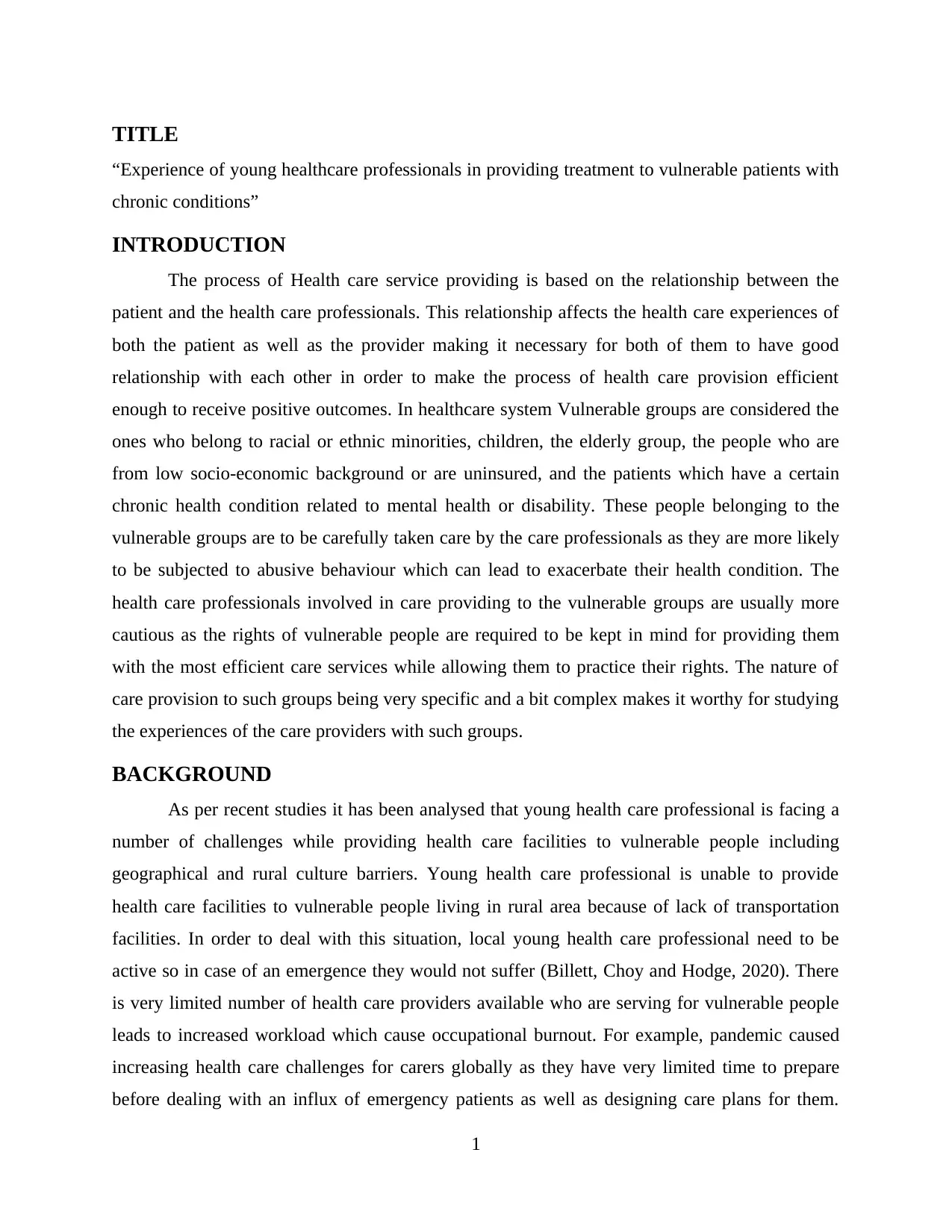
TITLE
“Experience of young healthcare professionals in providing treatment to vulnerable patients with
chronic conditions”
INTRODUCTION
The process of Health care service providing is based on the relationship between the
patient and the health care professionals. This relationship affects the health care experiences of
both the patient as well as the provider making it necessary for both of them to have good
relationship with each other in order to make the process of health care provision efficient
enough to receive positive outcomes. In healthcare system Vulnerable groups are considered the
ones who belong to racial or ethnic minorities, children, the elderly group, the people who are
from low socio-economic background or are uninsured, and the patients which have a certain
chronic health condition related to mental health or disability. These people belonging to the
vulnerable groups are to be carefully taken care by the care professionals as they are more likely
to be subjected to abusive behaviour which can lead to exacerbate their health condition. The
health care professionals involved in care providing to the vulnerable groups are usually more
cautious as the rights of vulnerable people are required to be kept in mind for providing them
with the most efficient care services while allowing them to practice their rights. The nature of
care provision to such groups being very specific and a bit complex makes it worthy for studying
the experiences of the care providers with such groups.
BACKGROUND
As per recent studies it has been analysed that young health care professional is facing a
number of challenges while providing health care facilities to vulnerable people including
geographical and rural culture barriers. Young health care professional is unable to provide
health care facilities to vulnerable people living in rural area because of lack of transportation
facilities. In order to deal with this situation, local young health care professional need to be
active so in case of an emergence they would not suffer (Billett, Choy and Hodge, 2020). There
is very limited number of health care providers available who are serving for vulnerable people
leads to increased workload which cause occupational burnout. For example, pandemic caused
increasing health care challenges for carers globally as they have very limited time to prepare
before dealing with an influx of emergency patients as well as designing care plans for them.
1
“Experience of young healthcare professionals in providing treatment to vulnerable patients with
chronic conditions”
INTRODUCTION
The process of Health care service providing is based on the relationship between the
patient and the health care professionals. This relationship affects the health care experiences of
both the patient as well as the provider making it necessary for both of them to have good
relationship with each other in order to make the process of health care provision efficient
enough to receive positive outcomes. In healthcare system Vulnerable groups are considered the
ones who belong to racial or ethnic minorities, children, the elderly group, the people who are
from low socio-economic background or are uninsured, and the patients which have a certain
chronic health condition related to mental health or disability. These people belonging to the
vulnerable groups are to be carefully taken care by the care professionals as they are more likely
to be subjected to abusive behaviour which can lead to exacerbate their health condition. The
health care professionals involved in care providing to the vulnerable groups are usually more
cautious as the rights of vulnerable people are required to be kept in mind for providing them
with the most efficient care services while allowing them to practice their rights. The nature of
care provision to such groups being very specific and a bit complex makes it worthy for studying
the experiences of the care providers with such groups.
BACKGROUND
As per recent studies it has been analysed that young health care professional is facing a
number of challenges while providing health care facilities to vulnerable people including
geographical and rural culture barriers. Young health care professional is unable to provide
health care facilities to vulnerable people living in rural area because of lack of transportation
facilities. In order to deal with this situation, local young health care professional need to be
active so in case of an emergence they would not suffer (Billett, Choy and Hodge, 2020). There
is very limited number of health care providers available who are serving for vulnerable people
leads to increased workload which cause occupational burnout. For example, pandemic caused
increasing health care challenges for carers globally as they have very limited time to prepare
before dealing with an influx of emergency patients as well as designing care plans for them.
1
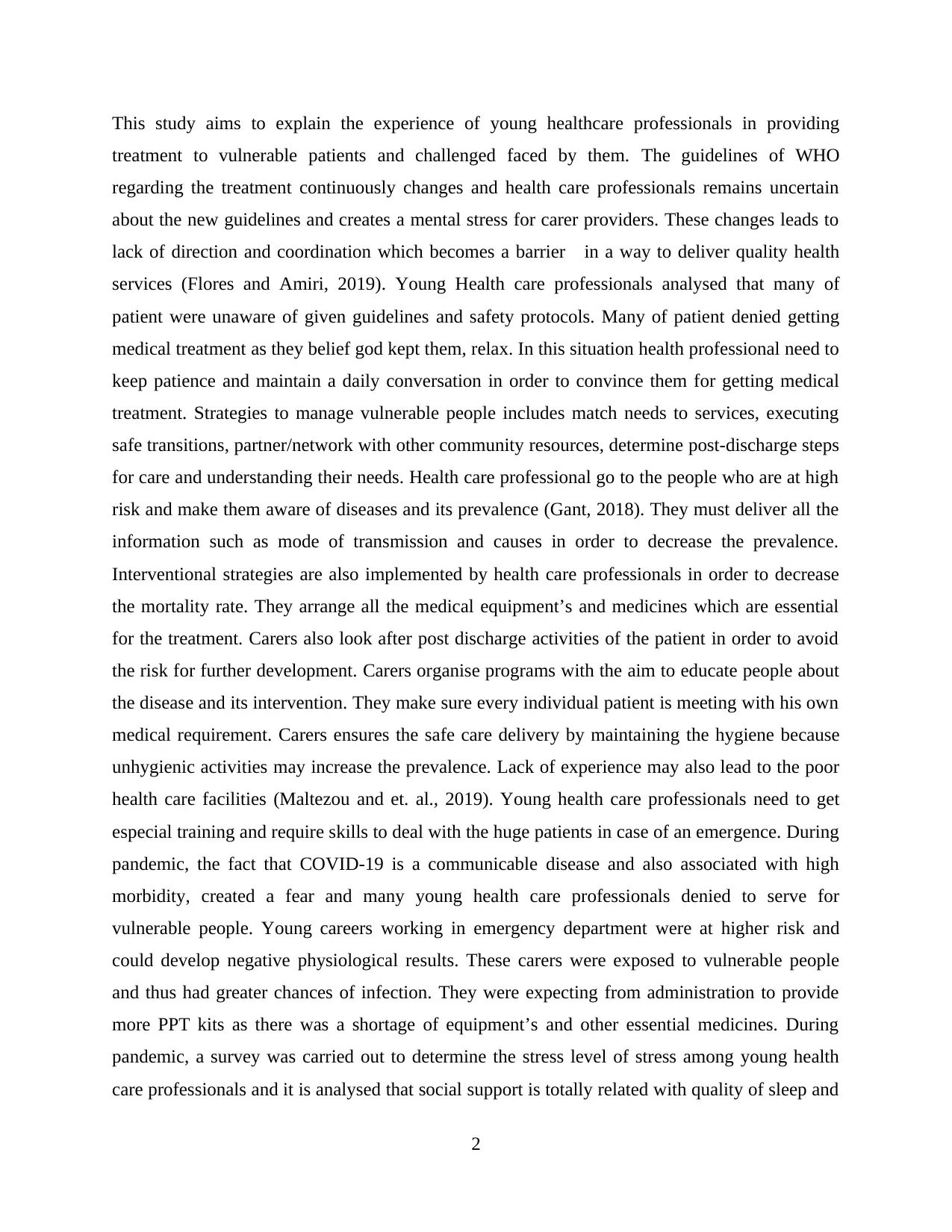
This study aims to explain the experience of young healthcare professionals in providing
treatment to vulnerable patients and challenged faced by them. The guidelines of WHO
regarding the treatment continuously changes and health care professionals remains uncertain
about the new guidelines and creates a mental stress for carer providers. These changes leads to
lack of direction and coordination which becomes a barrier in a way to deliver quality health
services (Flores and Amiri, 2019). Young Health care professionals analysed that many of
patient were unaware of given guidelines and safety protocols. Many of patient denied getting
medical treatment as they belief god kept them, relax. In this situation health professional need to
keep patience and maintain a daily conversation in order to convince them for getting medical
treatment. Strategies to manage vulnerable people includes match needs to services, executing
safe transitions, partner/network with other community resources, determine post-discharge steps
for care and understanding their needs. Health care professional go to the people who are at high
risk and make them aware of diseases and its prevalence (Gant, 2018). They must deliver all the
information such as mode of transmission and causes in order to decrease the prevalence.
Interventional strategies are also implemented by health care professionals in order to decrease
the mortality rate. They arrange all the medical equipment’s and medicines which are essential
for the treatment. Carers also look after post discharge activities of the patient in order to avoid
the risk for further development. Carers organise programs with the aim to educate people about
the disease and its intervention. They make sure every individual patient is meeting with his own
medical requirement. Carers ensures the safe care delivery by maintaining the hygiene because
unhygienic activities may increase the prevalence. Lack of experience may also lead to the poor
health care facilities (Maltezou and et. al., 2019). Young health care professionals need to get
especial training and require skills to deal with the huge patients in case of an emergence. During
pandemic, the fact that COVID-19 is a communicable disease and also associated with high
morbidity, created a fear and many young health care professionals denied to serve for
vulnerable people. Young careers working in emergency department were at higher risk and
could develop negative physiological results. These carers were exposed to vulnerable people
and thus had greater chances of infection. They were expecting from administration to provide
more PPT kits as there was a shortage of equipment’s and other essential medicines. During
pandemic, a survey was carried out to determine the stress level of stress among young health
care professionals and it is analysed that social support is totally related with quality of sleep and
2
treatment to vulnerable patients and challenged faced by them. The guidelines of WHO
regarding the treatment continuously changes and health care professionals remains uncertain
about the new guidelines and creates a mental stress for carer providers. These changes leads to
lack of direction and coordination which becomes a barrier in a way to deliver quality health
services (Flores and Amiri, 2019). Young Health care professionals analysed that many of
patient were unaware of given guidelines and safety protocols. Many of patient denied getting
medical treatment as they belief god kept them, relax. In this situation health professional need to
keep patience and maintain a daily conversation in order to convince them for getting medical
treatment. Strategies to manage vulnerable people includes match needs to services, executing
safe transitions, partner/network with other community resources, determine post-discharge steps
for care and understanding their needs. Health care professional go to the people who are at high
risk and make them aware of diseases and its prevalence (Gant, 2018). They must deliver all the
information such as mode of transmission and causes in order to decrease the prevalence.
Interventional strategies are also implemented by health care professionals in order to decrease
the mortality rate. They arrange all the medical equipment’s and medicines which are essential
for the treatment. Carers also look after post discharge activities of the patient in order to avoid
the risk for further development. Carers organise programs with the aim to educate people about
the disease and its intervention. They make sure every individual patient is meeting with his own
medical requirement. Carers ensures the safe care delivery by maintaining the hygiene because
unhygienic activities may increase the prevalence. Lack of experience may also lead to the poor
health care facilities (Maltezou and et. al., 2019). Young health care professionals need to get
especial training and require skills to deal with the huge patients in case of an emergence. During
pandemic, the fact that COVID-19 is a communicable disease and also associated with high
morbidity, created a fear and many young health care professionals denied to serve for
vulnerable people. Young careers working in emergency department were at higher risk and
could develop negative physiological results. These carers were exposed to vulnerable people
and thus had greater chances of infection. They were expecting from administration to provide
more PPT kits as there was a shortage of equipment’s and other essential medicines. During
pandemic, a survey was carried out to determine the stress level of stress among young health
care professionals and it is analysed that social support is totally related with quality of sleep and
2
Secure Best Marks with AI Grader
Need help grading? Try our AI Grader for instant feedback on your assignments.
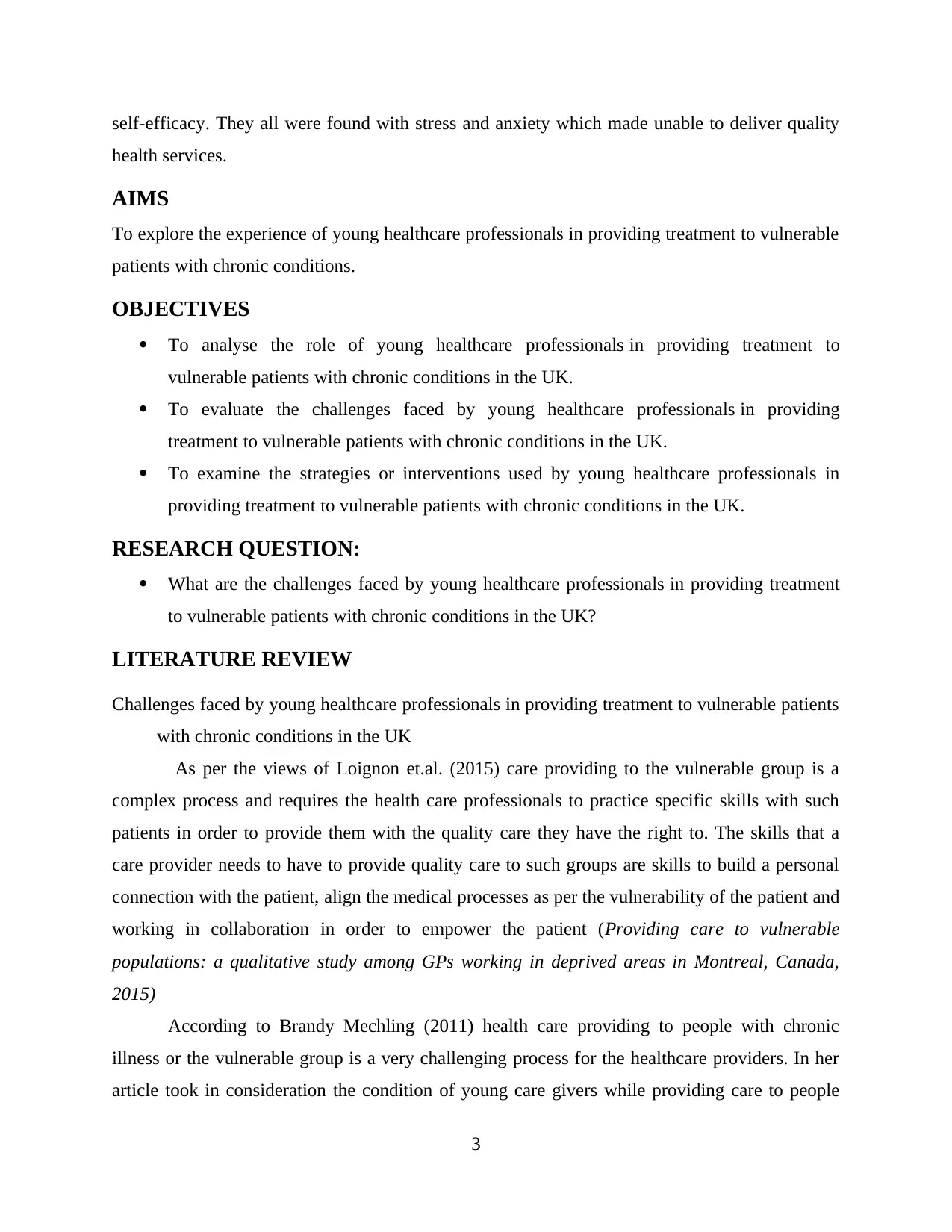
self-efficacy. They all were found with stress and anxiety which made unable to deliver quality
health services.
AIMS
To explore the experience of young healthcare professionals in providing treatment to vulnerable
patients with chronic conditions.
OBJECTIVES
To analyse the role of young healthcare professionals in providing treatment to
vulnerable patients with chronic conditions in the UK.
To evaluate the challenges faced by young healthcare professionals in providing
treatment to vulnerable patients with chronic conditions in the UK.
To examine the strategies or interventions used by young healthcare professionals in
providing treatment to vulnerable patients with chronic conditions in the UK.
RESEARCH QUESTION:
What are the challenges faced by young healthcare professionals in providing treatment
to vulnerable patients with chronic conditions in the UK?
LITERATURE REVIEW
Challenges faced by young healthcare professionals in providing treatment to vulnerable patients
with chronic conditions in the UK
As per the views of Loignon et.al. (2015) care providing to the vulnerable group is a
complex process and requires the health care professionals to practice specific skills with such
patients in order to provide them with the quality care they have the right to. The skills that a
care provider needs to have to provide quality care to such groups are skills to build a personal
connection with the patient, align the medical processes as per the vulnerability of the patient and
working in collaboration in order to empower the patient (Providing care to vulnerable
populations: a qualitative study among GPs working in deprived areas in Montreal, Canada,
2015)
According to Brandy Mechling (2011) health care providing to people with chronic
illness or the vulnerable group is a very challenging process for the healthcare providers. In her
article took in consideration the condition of young care givers while providing care to people
3
health services.
AIMS
To explore the experience of young healthcare professionals in providing treatment to vulnerable
patients with chronic conditions.
OBJECTIVES
To analyse the role of young healthcare professionals in providing treatment to
vulnerable patients with chronic conditions in the UK.
To evaluate the challenges faced by young healthcare professionals in providing
treatment to vulnerable patients with chronic conditions in the UK.
To examine the strategies or interventions used by young healthcare professionals in
providing treatment to vulnerable patients with chronic conditions in the UK.
RESEARCH QUESTION:
What are the challenges faced by young healthcare professionals in providing treatment
to vulnerable patients with chronic conditions in the UK?
LITERATURE REVIEW
Challenges faced by young healthcare professionals in providing treatment to vulnerable patients
with chronic conditions in the UK
As per the views of Loignon et.al. (2015) care providing to the vulnerable group is a
complex process and requires the health care professionals to practice specific skills with such
patients in order to provide them with the quality care they have the right to. The skills that a
care provider needs to have to provide quality care to such groups are skills to build a personal
connection with the patient, align the medical processes as per the vulnerability of the patient and
working in collaboration in order to empower the patient (Providing care to vulnerable
populations: a qualitative study among GPs working in deprived areas in Montreal, Canada,
2015)
According to Brandy Mechling (2011) health care providing to people with chronic
illness or the vulnerable group is a very challenging process for the healthcare providers. In her
article took in consideration the condition of young care givers while providing care to people
3
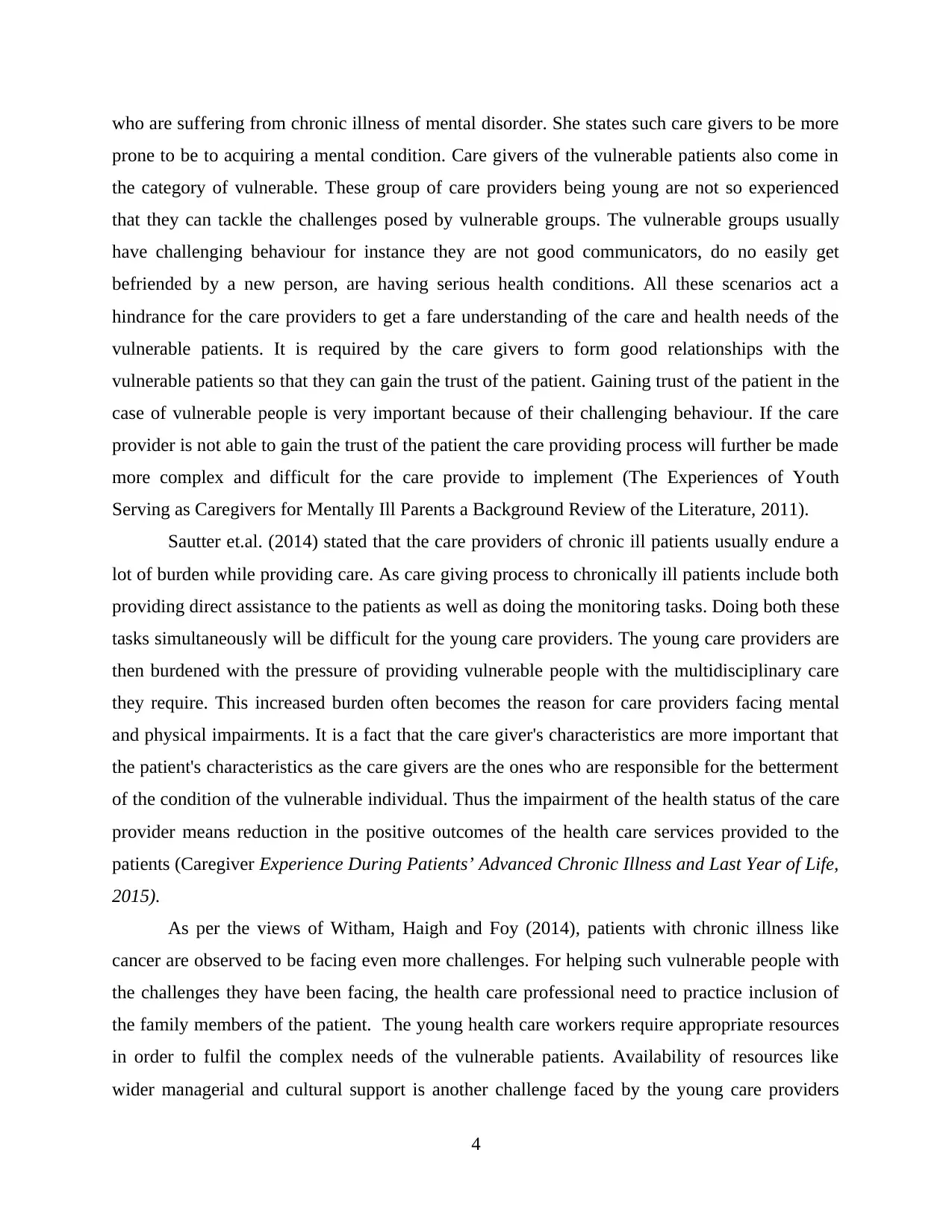
who are suffering from chronic illness of mental disorder. She states such care givers to be more
prone to be to acquiring a mental condition. Care givers of the vulnerable patients also come in
the category of vulnerable. These group of care providers being young are not so experienced
that they can tackle the challenges posed by vulnerable groups. The vulnerable groups usually
have challenging behaviour for instance they are not good communicators, do no easily get
befriended by a new person, are having serious health conditions. All these scenarios act a
hindrance for the care providers to get a fare understanding of the care and health needs of the
vulnerable patients. It is required by the care givers to form good relationships with the
vulnerable patients so that they can gain the trust of the patient. Gaining trust of the patient in the
case of vulnerable people is very important because of their challenging behaviour. If the care
provider is not able to gain the trust of the patient the care providing process will further be made
more complex and difficult for the care provide to implement (The Experiences of Youth
Serving as Caregivers for Mentally Ill Parents a Background Review of the Literature, 2011).
Sautter et.al. (2014) stated that the care providers of chronic ill patients usually endure a
lot of burden while providing care. As care giving process to chronically ill patients include both
providing direct assistance to the patients as well as doing the monitoring tasks. Doing both these
tasks simultaneously will be difficult for the young care providers. The young care providers are
then burdened with the pressure of providing vulnerable people with the multidisciplinary care
they require. This increased burden often becomes the reason for care providers facing mental
and physical impairments. It is a fact that the care giver's characteristics are more important that
the patient's characteristics as the care givers are the ones who are responsible for the betterment
of the condition of the vulnerable individual. Thus the impairment of the health status of the care
provider means reduction in the positive outcomes of the health care services provided to the
patients (Caregiver Experience During Patients’ Advanced Chronic Illness and Last Year of Life,
2015).
As per the views of Witham, Haigh and Foy (2014), patients with chronic illness like
cancer are observed to be facing even more challenges. For helping such vulnerable people with
the challenges they have been facing, the health care professional need to practice inclusion of
the family members of the patient. The young health care workers require appropriate resources
in order to fulfil the complex needs of the vulnerable patients. Availability of resources like
wider managerial and cultural support is another challenge faced by the young care providers
4
prone to be to acquiring a mental condition. Care givers of the vulnerable patients also come in
the category of vulnerable. These group of care providers being young are not so experienced
that they can tackle the challenges posed by vulnerable groups. The vulnerable groups usually
have challenging behaviour for instance they are not good communicators, do no easily get
befriended by a new person, are having serious health conditions. All these scenarios act a
hindrance for the care providers to get a fare understanding of the care and health needs of the
vulnerable patients. It is required by the care givers to form good relationships with the
vulnerable patients so that they can gain the trust of the patient. Gaining trust of the patient in the
case of vulnerable people is very important because of their challenging behaviour. If the care
provider is not able to gain the trust of the patient the care providing process will further be made
more complex and difficult for the care provide to implement (The Experiences of Youth
Serving as Caregivers for Mentally Ill Parents a Background Review of the Literature, 2011).
Sautter et.al. (2014) stated that the care providers of chronic ill patients usually endure a
lot of burden while providing care. As care giving process to chronically ill patients include both
providing direct assistance to the patients as well as doing the monitoring tasks. Doing both these
tasks simultaneously will be difficult for the young care providers. The young care providers are
then burdened with the pressure of providing vulnerable people with the multidisciplinary care
they require. This increased burden often becomes the reason for care providers facing mental
and physical impairments. It is a fact that the care giver's characteristics are more important that
the patient's characteristics as the care givers are the ones who are responsible for the betterment
of the condition of the vulnerable individual. Thus the impairment of the health status of the care
provider means reduction in the positive outcomes of the health care services provided to the
patients (Caregiver Experience During Patients’ Advanced Chronic Illness and Last Year of Life,
2015).
As per the views of Witham, Haigh and Foy (2014), patients with chronic illness like
cancer are observed to be facing even more challenges. For helping such vulnerable people with
the challenges they have been facing, the health care professional need to practice inclusion of
the family members of the patient. The young health care workers require appropriate resources
in order to fulfil the complex needs of the vulnerable patients. Availability of resources like
wider managerial and cultural support is another challenge faced by the young care providers
4
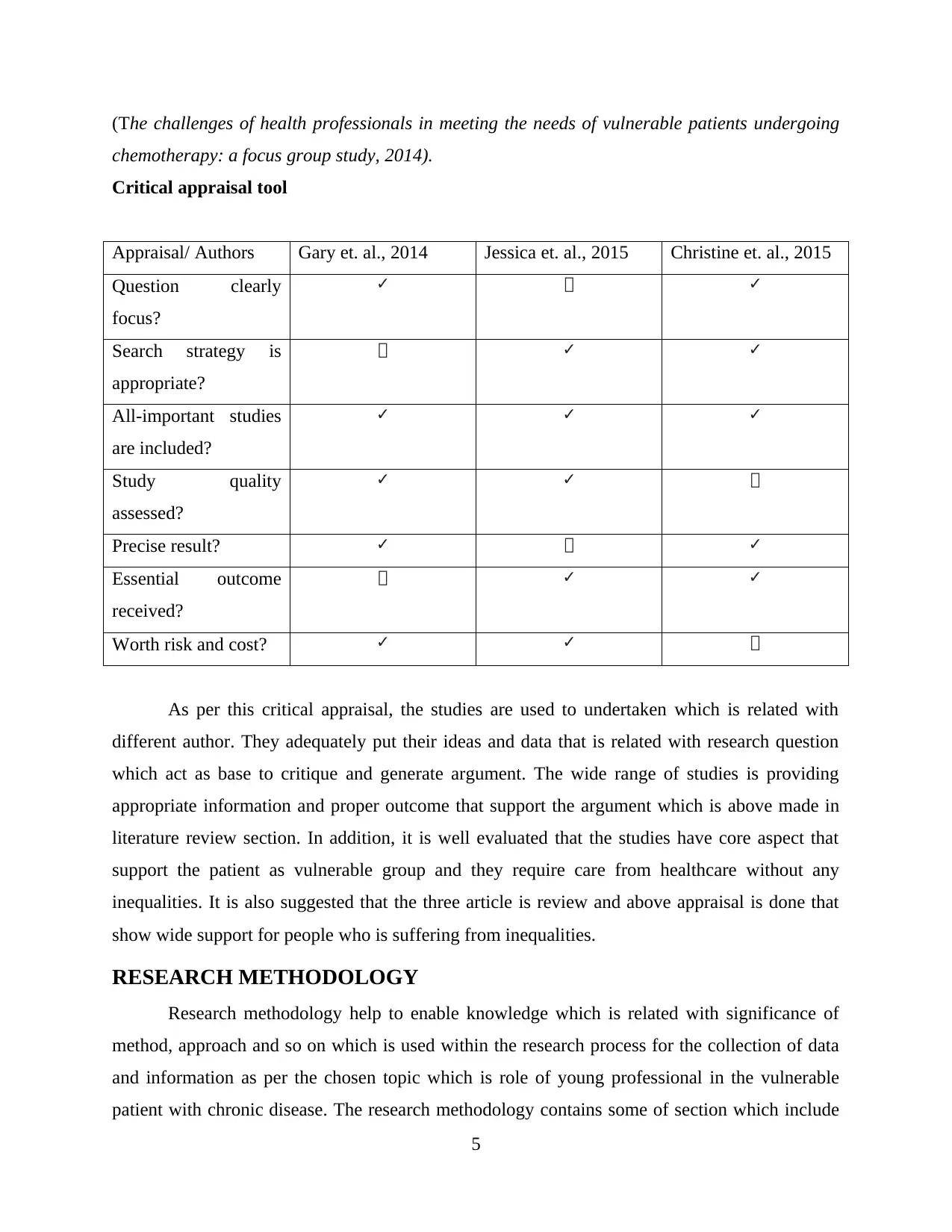
(The challenges of health professionals in meeting the needs of vulnerable patients undergoing
chemotherapy: a focus group study, 2014).
Critical appraisal tool
Appraisal/ Authors Gary et. al., 2014 Jessica et. al., 2015 Christine et. al., 2015
Question clearly
focus?
✓ ❌ ✓
Search strategy is
appropriate?
❌ ✓ ✓
All-important studies
are included?
✓ ✓ ✓
Study quality
assessed?
✓ ✓ ❌
Precise result? ✓ ❌ ✓
Essential outcome
received?
❌ ✓ ✓
Worth risk and cost? ✓ ✓ ❌
As per this critical appraisal, the studies are used to undertaken which is related with
different author. They adequately put their ideas and data that is related with research question
which act as base to critique and generate argument. The wide range of studies is providing
appropriate information and proper outcome that support the argument which is above made in
literature review section. In addition, it is well evaluated that the studies have core aspect that
support the patient as vulnerable group and they require care from healthcare without any
inequalities. It is also suggested that the three article is review and above appraisal is done that
show wide support for people who is suffering from inequalities.
RESEARCH METHODOLOGY
Research methodology help to enable knowledge which is related with significance of
method, approach and so on which is used within the research process for the collection of data
and information as per the chosen topic which is role of young professional in the vulnerable
patient with chronic disease. The research methodology contains some of section which include
5
chemotherapy: a focus group study, 2014).
Critical appraisal tool
Appraisal/ Authors Gary et. al., 2014 Jessica et. al., 2015 Christine et. al., 2015
Question clearly
focus?
✓ ❌ ✓
Search strategy is
appropriate?
❌ ✓ ✓
All-important studies
are included?
✓ ✓ ✓
Study quality
assessed?
✓ ✓ ❌
Precise result? ✓ ❌ ✓
Essential outcome
received?
❌ ✓ ✓
Worth risk and cost? ✓ ✓ ❌
As per this critical appraisal, the studies are used to undertaken which is related with
different author. They adequately put their ideas and data that is related with research question
which act as base to critique and generate argument. The wide range of studies is providing
appropriate information and proper outcome that support the argument which is above made in
literature review section. In addition, it is well evaluated that the studies have core aspect that
support the patient as vulnerable group and they require care from healthcare without any
inequalities. It is also suggested that the three article is review and above appraisal is done that
show wide support for people who is suffering from inequalities.
RESEARCH METHODOLOGY
Research methodology help to enable knowledge which is related with significance of
method, approach and so on which is used within the research process for the collection of data
and information as per the chosen topic which is role of young professional in the vulnerable
patient with chronic disease. The research methodology contains some of section which include
5
Paraphrase This Document
Need a fresh take? Get an instant paraphrase of this document with our AI Paraphraser
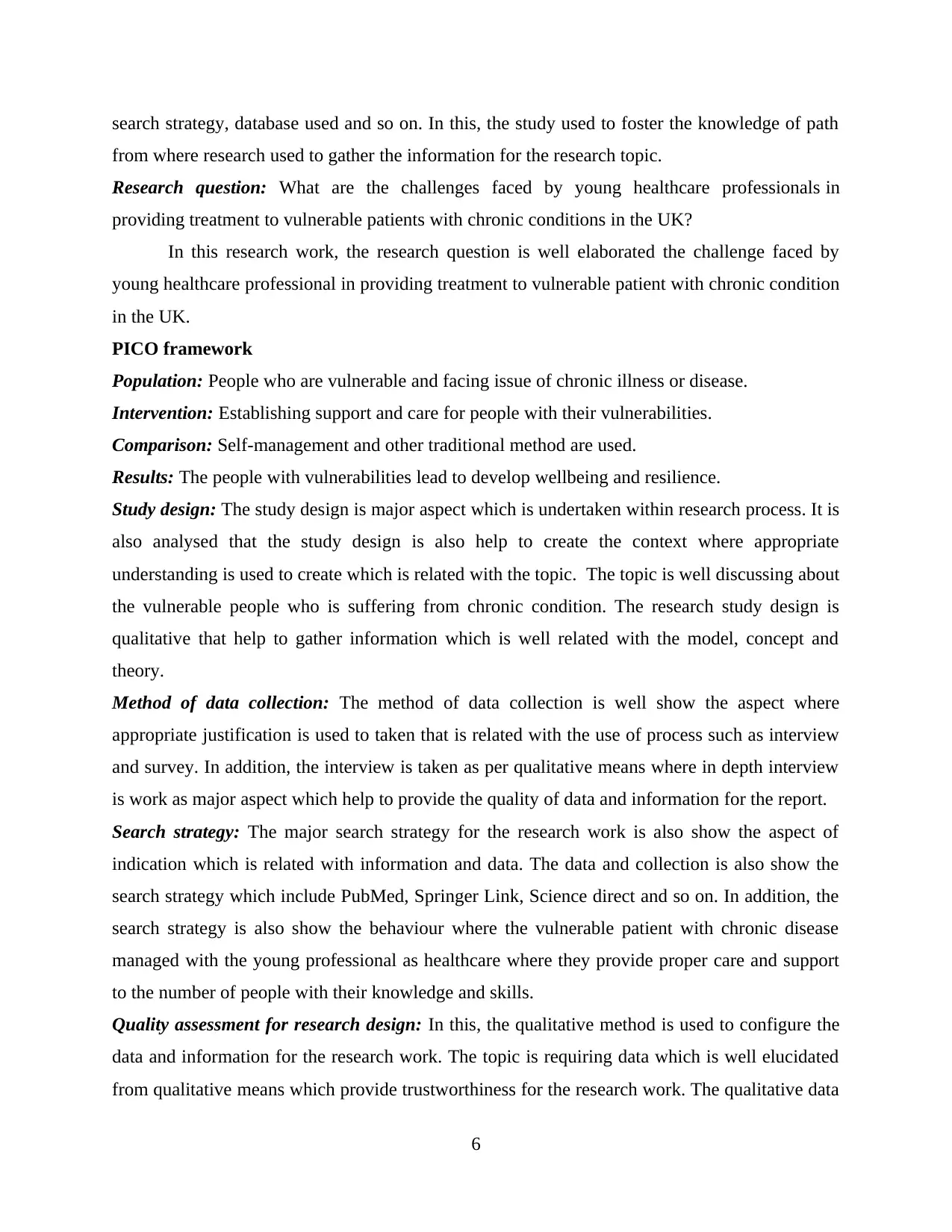
search strategy, database used and so on. In this, the study used to foster the knowledge of path
from where research used to gather the information for the research topic.
Research question: What are the challenges faced by young healthcare professionals in
providing treatment to vulnerable patients with chronic conditions in the UK?
In this research work, the research question is well elaborated the challenge faced by
young healthcare professional in providing treatment to vulnerable patient with chronic condition
in the UK.
PICO framework
Population: People who are vulnerable and facing issue of chronic illness or disease.
Intervention: Establishing support and care for people with their vulnerabilities.
Comparison: Self-management and other traditional method are used.
Results: The people with vulnerabilities lead to develop wellbeing and resilience.
Study design: The study design is major aspect which is undertaken within research process. It is
also analysed that the study design is also help to create the context where appropriate
understanding is used to create which is related with the topic. The topic is well discussing about
the vulnerable people who is suffering from chronic condition. The research study design is
qualitative that help to gather information which is well related with the model, concept and
theory.
Method of data collection: The method of data collection is well show the aspect where
appropriate justification is used to taken that is related with the use of process such as interview
and survey. In addition, the interview is taken as per qualitative means where in depth interview
is work as major aspect which help to provide the quality of data and information for the report.
Search strategy: The major search strategy for the research work is also show the aspect of
indication which is related with information and data. The data and collection is also show the
search strategy which include PubMed, Springer Link, Science direct and so on. In addition, the
search strategy is also show the behaviour where the vulnerable patient with chronic disease
managed with the young professional as healthcare where they provide proper care and support
to the number of people with their knowledge and skills.
Quality assessment for research design: In this, the qualitative method is used to configure the
data and information for the research work. The topic is requiring data which is well elucidated
from qualitative means which provide trustworthiness for the research work. The qualitative data
6
from where research used to gather the information for the research topic.
Research question: What are the challenges faced by young healthcare professionals in
providing treatment to vulnerable patients with chronic conditions in the UK?
In this research work, the research question is well elaborated the challenge faced by
young healthcare professional in providing treatment to vulnerable patient with chronic condition
in the UK.
PICO framework
Population: People who are vulnerable and facing issue of chronic illness or disease.
Intervention: Establishing support and care for people with their vulnerabilities.
Comparison: Self-management and other traditional method are used.
Results: The people with vulnerabilities lead to develop wellbeing and resilience.
Study design: The study design is major aspect which is undertaken within research process. It is
also analysed that the study design is also help to create the context where appropriate
understanding is used to create which is related with the topic. The topic is well discussing about
the vulnerable people who is suffering from chronic condition. The research study design is
qualitative that help to gather information which is well related with the model, concept and
theory.
Method of data collection: The method of data collection is well show the aspect where
appropriate justification is used to taken that is related with the use of process such as interview
and survey. In addition, the interview is taken as per qualitative means where in depth interview
is work as major aspect which help to provide the quality of data and information for the report.
Search strategy: The major search strategy for the research work is also show the aspect of
indication which is related with information and data. The data and collection is also show the
search strategy which include PubMed, Springer Link, Science direct and so on. In addition, the
search strategy is also show the behaviour where the vulnerable patient with chronic disease
managed with the young professional as healthcare where they provide proper care and support
to the number of people with their knowledge and skills.
Quality assessment for research design: In this, the qualitative method is used to configure the
data and information for the research work. The topic is requiring data which is well elucidated
from qualitative means which provide trustworthiness for the research work. The qualitative data
6
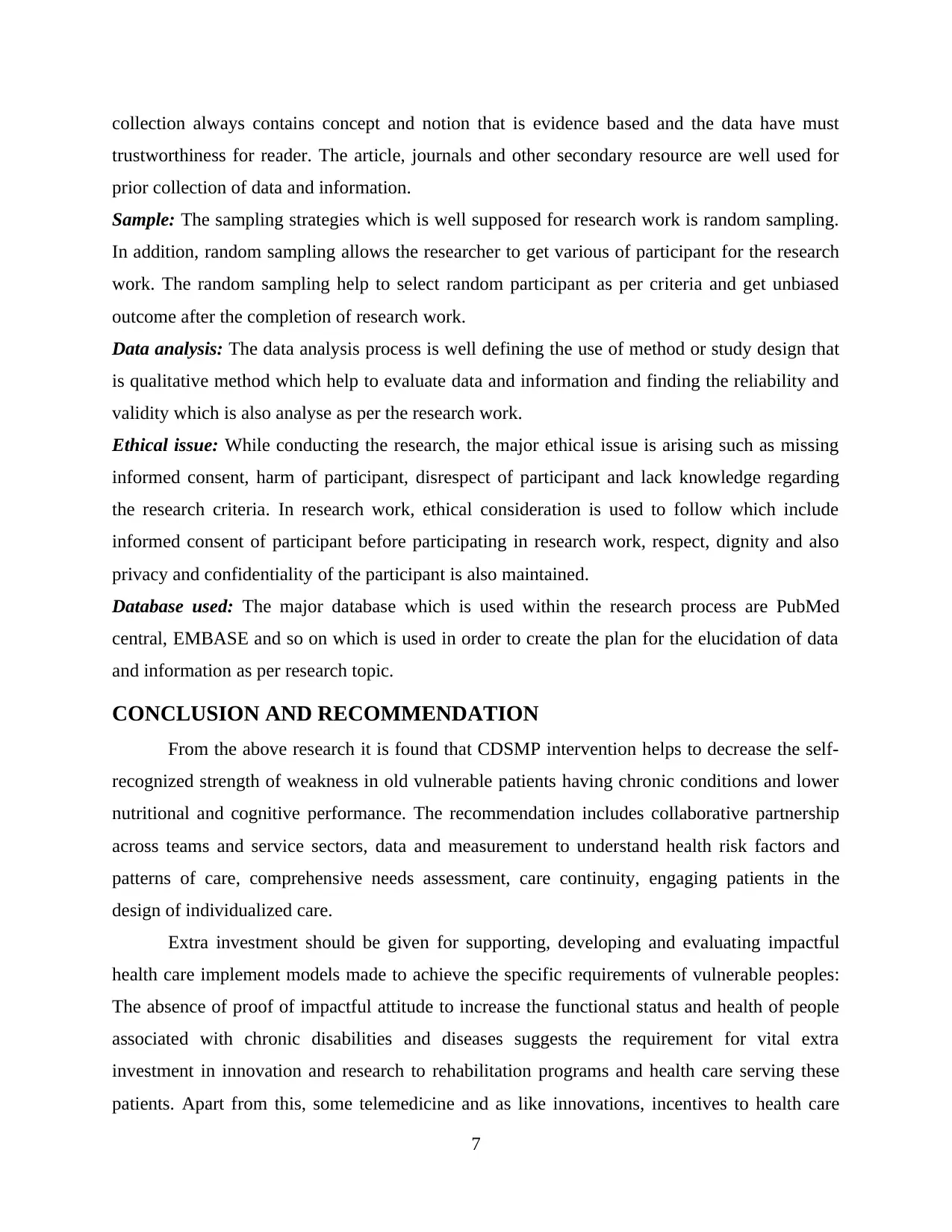
collection always contains concept and notion that is evidence based and the data have must
trustworthiness for reader. The article, journals and other secondary resource are well used for
prior collection of data and information.
Sample: The sampling strategies which is well supposed for research work is random sampling.
In addition, random sampling allows the researcher to get various of participant for the research
work. The random sampling help to select random participant as per criteria and get unbiased
outcome after the completion of research work.
Data analysis: The data analysis process is well defining the use of method or study design that
is qualitative method which help to evaluate data and information and finding the reliability and
validity which is also analyse as per the research work.
Ethical issue: While conducting the research, the major ethical issue is arising such as missing
informed consent, harm of participant, disrespect of participant and lack knowledge regarding
the research criteria. In research work, ethical consideration is used to follow which include
informed consent of participant before participating in research work, respect, dignity and also
privacy and confidentiality of the participant is also maintained.
Database used: The major database which is used within the research process are PubMed
central, EMBASE and so on which is used in order to create the plan for the elucidation of data
and information as per research topic.
CONCLUSION AND RECOMMENDATION
From the above research it is found that CDSMP intervention helps to decrease the self-
recognized strength of weakness in old vulnerable patients having chronic conditions and lower
nutritional and cognitive performance. The recommendation includes collaborative partnership
across teams and service sectors, data and measurement to understand health risk factors and
patterns of care, comprehensive needs assessment, care continuity, engaging patients in the
design of individualized care.
Extra investment should be given for supporting, developing and evaluating impactful
health care implement models made to achieve the specific requirements of vulnerable peoples:
The absence of proof of impactful attitude to increase the functional status and health of people
associated with chronic disabilities and diseases suggests the requirement for vital extra
investment in innovation and research to rehabilitation programs and health care serving these
patients. Apart from this, some telemedicine and as like innovations, incentives to health care
7
trustworthiness for reader. The article, journals and other secondary resource are well used for
prior collection of data and information.
Sample: The sampling strategies which is well supposed for research work is random sampling.
In addition, random sampling allows the researcher to get various of participant for the research
work. The random sampling help to select random participant as per criteria and get unbiased
outcome after the completion of research work.
Data analysis: The data analysis process is well defining the use of method or study design that
is qualitative method which help to evaluate data and information and finding the reliability and
validity which is also analyse as per the research work.
Ethical issue: While conducting the research, the major ethical issue is arising such as missing
informed consent, harm of participant, disrespect of participant and lack knowledge regarding
the research criteria. In research work, ethical consideration is used to follow which include
informed consent of participant before participating in research work, respect, dignity and also
privacy and confidentiality of the participant is also maintained.
Database used: The major database which is used within the research process are PubMed
central, EMBASE and so on which is used in order to create the plan for the elucidation of data
and information as per research topic.
CONCLUSION AND RECOMMENDATION
From the above research it is found that CDSMP intervention helps to decrease the self-
recognized strength of weakness in old vulnerable patients having chronic conditions and lower
nutritional and cognitive performance. The recommendation includes collaborative partnership
across teams and service sectors, data and measurement to understand health risk factors and
patterns of care, comprehensive needs assessment, care continuity, engaging patients in the
design of individualized care.
Extra investment should be given for supporting, developing and evaluating impactful
health care implement models made to achieve the specific requirements of vulnerable peoples:
The absence of proof of impactful attitude to increase the functional status and health of people
associated with chronic disabilities and diseases suggests the requirement for vital extra
investment in innovation and research to rehabilitation programs and health care serving these
patients. Apart from this, some telemedicine and as like innovations, incentives to health care
7
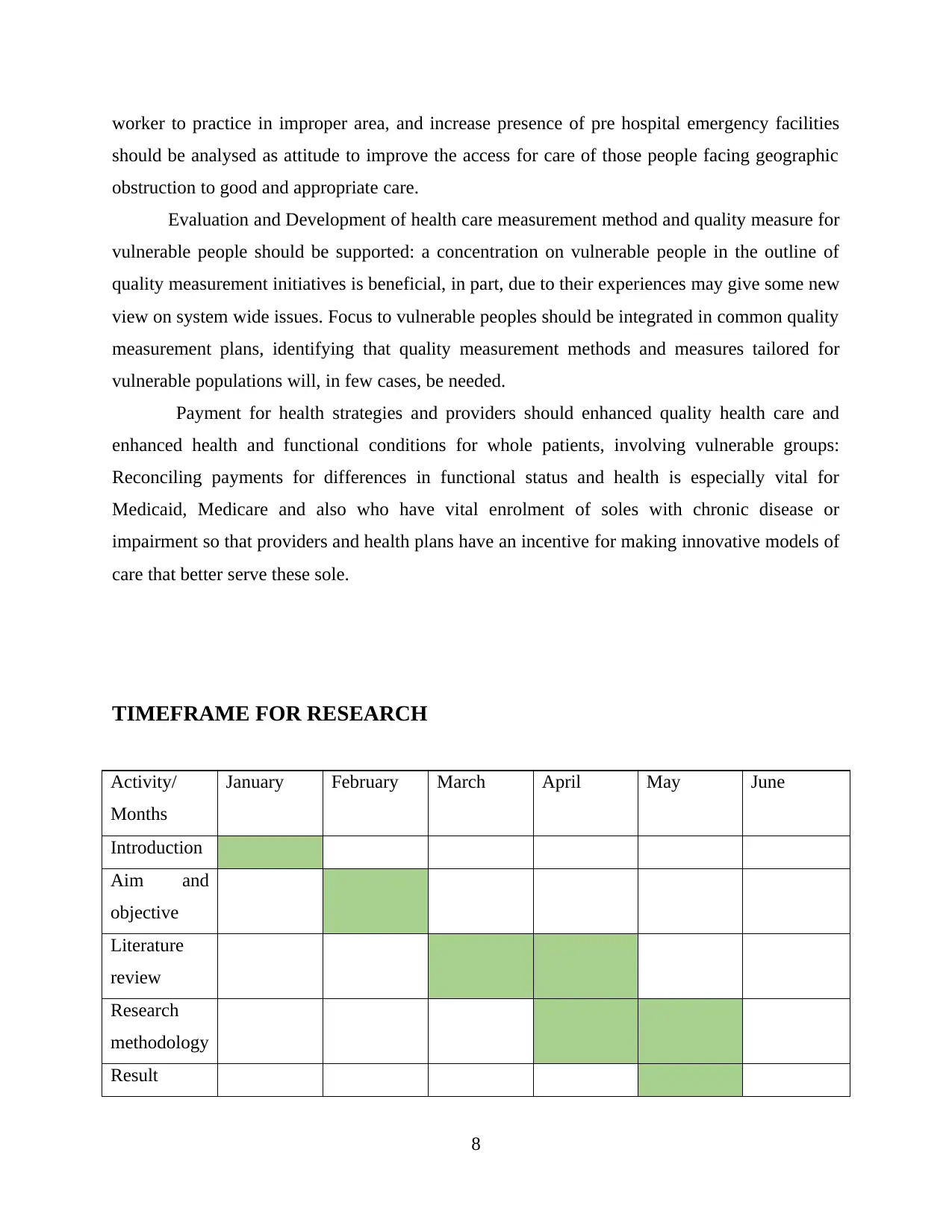
worker to practice in improper area, and increase presence of pre hospital emergency facilities
should be analysed as attitude to improve the access for care of those people facing geographic
obstruction to good and appropriate care.
Evaluation and Development of health care measurement method and quality measure for
vulnerable people should be supported: a concentration on vulnerable people in the outline of
quality measurement initiatives is beneficial, in part, due to their experiences may give some new
view on system wide issues. Focus to vulnerable peoples should be integrated in common quality
measurement plans, identifying that quality measurement methods and measures tailored for
vulnerable populations will, in few cases, be needed.
Payment for health strategies and providers should enhanced quality health care and
enhanced health and functional conditions for whole patients, involving vulnerable groups:
Reconciling payments for differences in functional status and health is especially vital for
Medicaid, Medicare and also who have vital enrolment of soles with chronic disease or
impairment so that providers and health plans have an incentive for making innovative models of
care that better serve these sole.
TIMEFRAME FOR RESEARCH
Activity/
Months
January February March April May June
Introduction
Aim and
objective
Literature
review
Research
methodology
Result
8
should be analysed as attitude to improve the access for care of those people facing geographic
obstruction to good and appropriate care.
Evaluation and Development of health care measurement method and quality measure for
vulnerable people should be supported: a concentration on vulnerable people in the outline of
quality measurement initiatives is beneficial, in part, due to their experiences may give some new
view on system wide issues. Focus to vulnerable peoples should be integrated in common quality
measurement plans, identifying that quality measurement methods and measures tailored for
vulnerable populations will, in few cases, be needed.
Payment for health strategies and providers should enhanced quality health care and
enhanced health and functional conditions for whole patients, involving vulnerable groups:
Reconciling payments for differences in functional status and health is especially vital for
Medicaid, Medicare and also who have vital enrolment of soles with chronic disease or
impairment so that providers and health plans have an incentive for making innovative models of
care that better serve these sole.
TIMEFRAME FOR RESEARCH
Activity/
Months
January February March April May June
Introduction
Aim and
objective
Literature
review
Research
methodology
Result
8
Secure Best Marks with AI Grader
Need help grading? Try our AI Grader for instant feedback on your assignments.
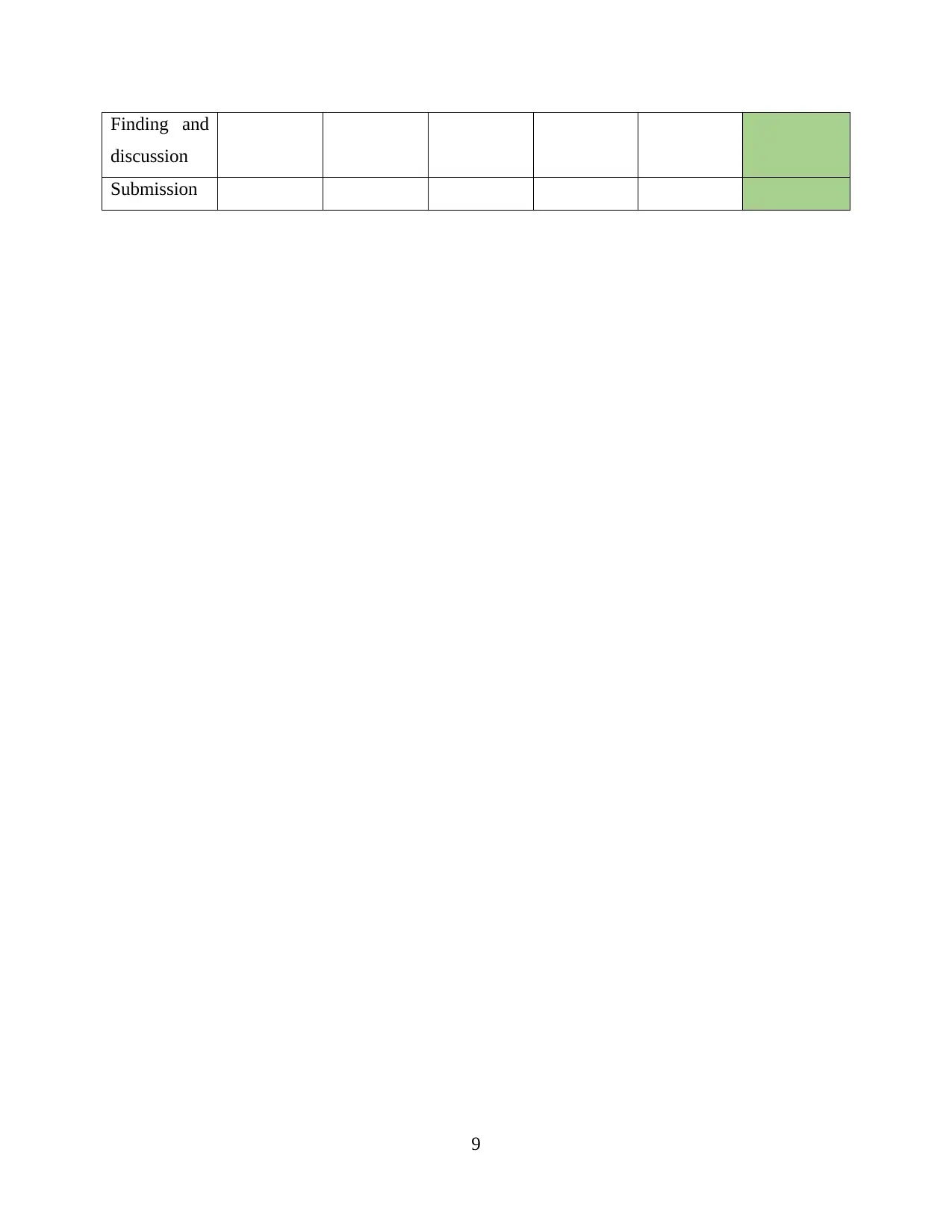
Finding and
discussion
Submission
9
discussion
Submission
9
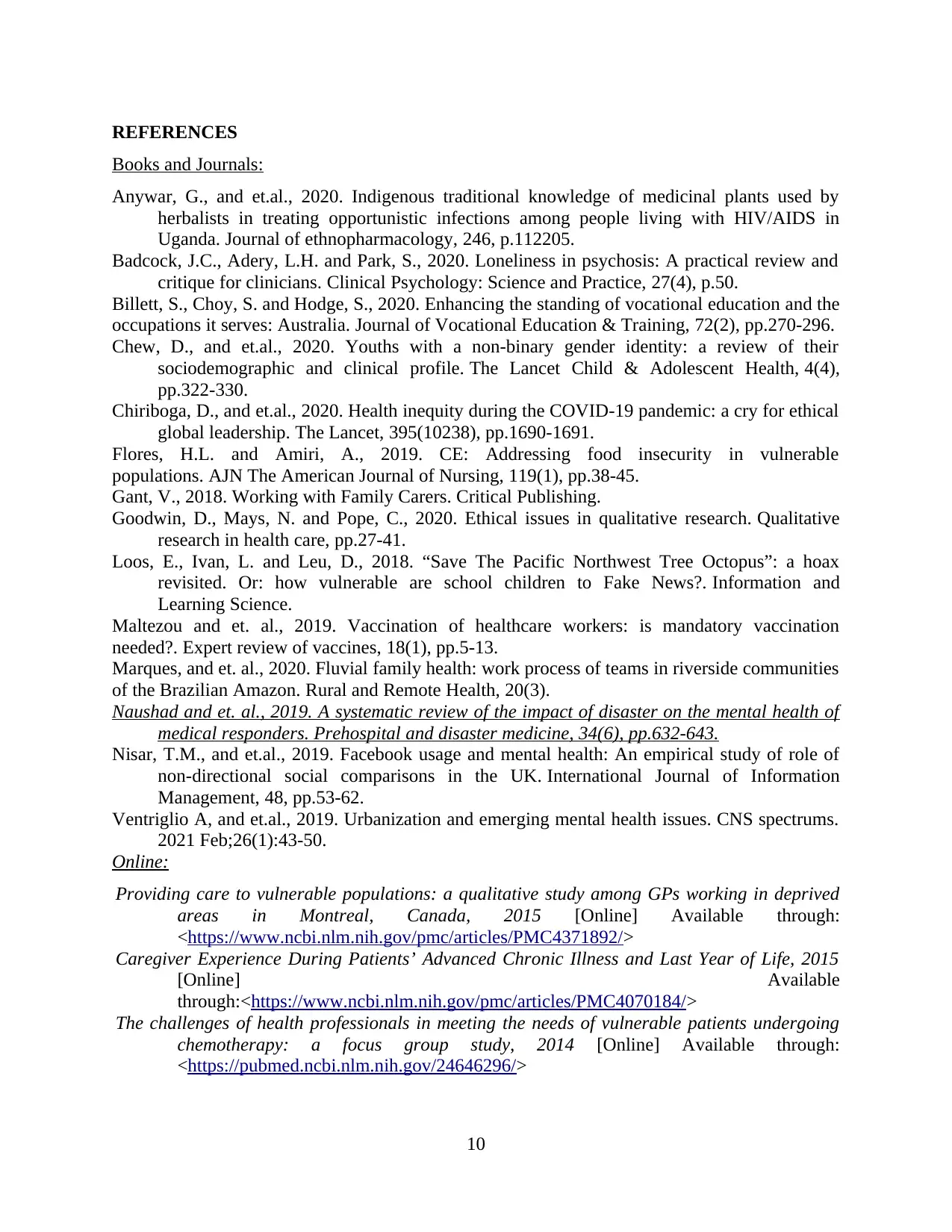
REFERENCES
Books and Journals:
Anywar, G., and et.al., 2020. Indigenous traditional knowledge of medicinal plants used by
herbalists in treating opportunistic infections among people living with HIV/AIDS in
Uganda. Journal of ethnopharmacology, 246, p.112205.
Badcock, J.C., Adery, L.H. and Park, S., 2020. Loneliness in psychosis: A practical review and
critique for clinicians. Clinical Psychology: Science and Practice, 27(4), p.50.
Billett, S., Choy, S. and Hodge, S., 2020. Enhancing the standing of vocational education and the
occupations it serves: Australia. Journal of Vocational Education & Training, 72(2), pp.270-296.
Chew, D., and et.al., 2020. Youths with a non-binary gender identity: a review of their
sociodemographic and clinical profile. The Lancet Child & Adolescent Health, 4(4),
pp.322-330.
Chiriboga, D., and et.al., 2020. Health inequity during the COVID-19 pandemic: a cry for ethical
global leadership. The Lancet, 395(10238), pp.1690-1691.
Flores, H.L. and Amiri, A., 2019. CE: Addressing food insecurity in vulnerable
populations. AJN The American Journal of Nursing, 119(1), pp.38-45.
Gant, V., 2018. Working with Family Carers. Critical Publishing.
Goodwin, D., Mays, N. and Pope, C., 2020. Ethical issues in qualitative research. Qualitative
research in health care, pp.27-41.
Loos, E., Ivan, L. and Leu, D., 2018. “Save The Pacific Northwest Tree Octopus”: a hoax
revisited. Or: how vulnerable are school children to Fake News?. Information and
Learning Science.
Maltezou and et. al., 2019. Vaccination of healthcare workers: is mandatory vaccination
needed?. Expert review of vaccines, 18(1), pp.5-13.
Marques, and et. al., 2020. Fluvial family health: work process of teams in riverside communities
of the Brazilian Amazon. Rural and Remote Health, 20(3).
Naushad and et. al., 2019. A systematic review of the impact of disaster on the mental health of
medical responders. Prehospital and disaster medicine, 34(6), pp.632-643.
Nisar, T.M., and et.al., 2019. Facebook usage and mental health: An empirical study of role of
non-directional social comparisons in the UK. International Journal of Information
Management, 48, pp.53-62.
Ventriglio A, and et.al., 2019. Urbanization and emerging mental health issues. CNS spectrums.
2021 Feb;26(1):43-50.
Online:
Providing care to vulnerable populations: a qualitative study among GPs working in deprived
areas in Montreal, Canada, 2015 [Online] Available through:
<https://www.ncbi.nlm.nih.gov/pmc/articles/PMC4371892/>
Caregiver Experience During Patients’ Advanced Chronic Illness and Last Year of Life, 2015
[Online] Available
through:<https://www.ncbi.nlm.nih.gov/pmc/articles/PMC4070184/>
The challenges of health professionals in meeting the needs of vulnerable patients undergoing
chemotherapy: a focus group study, 2014 [Online] Available through:
<https://pubmed.ncbi.nlm.nih.gov/24646296/>
10
Books and Journals:
Anywar, G., and et.al., 2020. Indigenous traditional knowledge of medicinal plants used by
herbalists in treating opportunistic infections among people living with HIV/AIDS in
Uganda. Journal of ethnopharmacology, 246, p.112205.
Badcock, J.C., Adery, L.H. and Park, S., 2020. Loneliness in psychosis: A practical review and
critique for clinicians. Clinical Psychology: Science and Practice, 27(4), p.50.
Billett, S., Choy, S. and Hodge, S., 2020. Enhancing the standing of vocational education and the
occupations it serves: Australia. Journal of Vocational Education & Training, 72(2), pp.270-296.
Chew, D., and et.al., 2020. Youths with a non-binary gender identity: a review of their
sociodemographic and clinical profile. The Lancet Child & Adolescent Health, 4(4),
pp.322-330.
Chiriboga, D., and et.al., 2020. Health inequity during the COVID-19 pandemic: a cry for ethical
global leadership. The Lancet, 395(10238), pp.1690-1691.
Flores, H.L. and Amiri, A., 2019. CE: Addressing food insecurity in vulnerable
populations. AJN The American Journal of Nursing, 119(1), pp.38-45.
Gant, V., 2018. Working with Family Carers. Critical Publishing.
Goodwin, D., Mays, N. and Pope, C., 2020. Ethical issues in qualitative research. Qualitative
research in health care, pp.27-41.
Loos, E., Ivan, L. and Leu, D., 2018. “Save The Pacific Northwest Tree Octopus”: a hoax
revisited. Or: how vulnerable are school children to Fake News?. Information and
Learning Science.
Maltezou and et. al., 2019. Vaccination of healthcare workers: is mandatory vaccination
needed?. Expert review of vaccines, 18(1), pp.5-13.
Marques, and et. al., 2020. Fluvial family health: work process of teams in riverside communities
of the Brazilian Amazon. Rural and Remote Health, 20(3).
Naushad and et. al., 2019. A systematic review of the impact of disaster on the mental health of
medical responders. Prehospital and disaster medicine, 34(6), pp.632-643.
Nisar, T.M., and et.al., 2019. Facebook usage and mental health: An empirical study of role of
non-directional social comparisons in the UK. International Journal of Information
Management, 48, pp.53-62.
Ventriglio A, and et.al., 2019. Urbanization and emerging mental health issues. CNS spectrums.
2021 Feb;26(1):43-50.
Online:
Providing care to vulnerable populations: a qualitative study among GPs working in deprived
areas in Montreal, Canada, 2015 [Online] Available through:
<https://www.ncbi.nlm.nih.gov/pmc/articles/PMC4371892/>
Caregiver Experience During Patients’ Advanced Chronic Illness and Last Year of Life, 2015
[Online] Available
through:<https://www.ncbi.nlm.nih.gov/pmc/articles/PMC4070184/>
The challenges of health professionals in meeting the needs of vulnerable patients undergoing
chemotherapy: a focus group study, 2014 [Online] Available through:
<https://pubmed.ncbi.nlm.nih.gov/24646296/>
10

11
1 out of 13
Related Documents
Your All-in-One AI-Powered Toolkit for Academic Success.
+13062052269
info@desklib.com
Available 24*7 on WhatsApp / Email
![[object Object]](/_next/static/media/star-bottom.7253800d.svg)
Unlock your academic potential
© 2024 | Zucol Services PVT LTD | All rights reserved.





